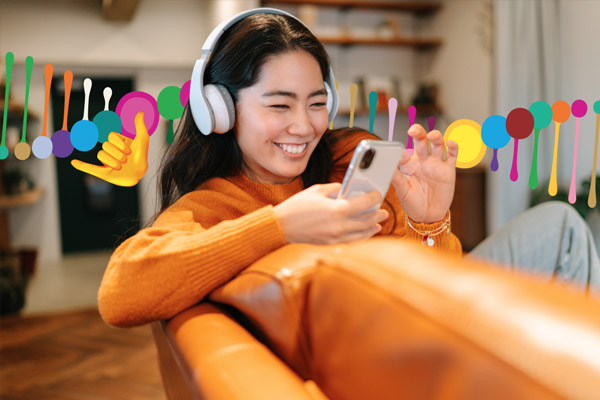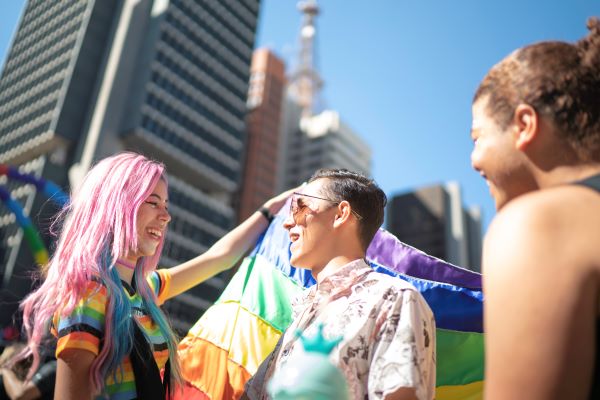Whether you’re gay, lesbian, bisexual, transgender, intersex, queer or asexual (LGBTIQA+), you may be curious about what life might be like for you in Australia.
Thankfully these days Australia is a relatively safe location for LGBTIQA+ people, and many people feel proud to embrace who they are and live freely and openly. There are local and national LGBTIQA+ celebration days and plenty of social groups to join, as well as support services tailored to the needs of LGBTIQA+ people.
If you’re thinking of travelling down under – or making the move for study or work – here’s a quick primer on LGBTIQA+ life in Australia.
LGBTIQA+ legislation in Australia
As an LGBTIQA+ person you will be afforded certain legal protections in Australia. There have been anti-discrimination laws protecting LGBTIQA+ people in Australia for a long time and, generally, things are continuing to move in the right direction.
Homosexuality has been decriminalised in every Australian state and territory since 1997. In 2017, the nation voted in favour of marriage equality for same-sex couples, and this is now a legal right.
LGBTIQA+ people also have protections in the workplace. The Fair Work Act prevents employers taking adverse action against an employee or prospective employee because of their sexual orientation, gender identity, or intersex status.
LGBTIQA+ culture in Australia
There is a strong queer culture running throughout the country’s history – and many pioneering figures have paved the way to make LGBTIQA+ people more visible and accepted in Australia. In recent decades, visibility and accessibility of gay and queer culture has come a long way across the country.
Queer culture can be very joyful – and who doesn’t love a good party? Throughout the year, there are many days of significance, celebration and remembrance for the Australian LGBTIQA+ community, such as:
- Mardi Gras (Sydney, New South Wales)
- Midsumma (Melbourne, Victoria)
- Brisbane Pride (Brisbane, Queensland)
- Perth Pride (Perth, Western Australia)
- Top End Pride (Darwin, Northern Territory)
- TasPride (Hobart, Tasmania)
- Pride Adelaide (Adelaide, South Australia)
- Trans Day of Visibility (31 March)
- International Day Against Homophobia, Biphobia and Transphobia (17 May)
- Pride Month (June)
- Wear it Purple Day (last Friday of August)
- Bi Visibility Day (23 September)
- World AIDS Day (1 December)
The Australian Pride Network regularly updates its website with upcoming LGBTIQA+ events and celebrations, including both smaller and regional events listed for each Australian state and territory.
In addition to celebration days and days of significance, you’ll be able to find lots of social opportunities for LGBTIQA+ people. If you’re a movie-lover, you’ll be able to attend queer film festivals, such as the Melbourne Queer Film Festival, Queer Screen, and Tilde. If you’re into nightlife, there are plenty of gay and queer bars and clubs, which celebrate everything from drag to kink culture. Gay dating apps such as Grindr are also legal to use.
If you’re into sport and fitness, you may like to join a group such as Climbing QTs, a club for LGBTIQA+ climbers, or find a local team in a sporting code of your choice. The Pride in Sport website may be able to point you in the right direction.
Radio stations – such as Joy 94.9 – and queer shows on local community radio are a good way to keep in the loop on events and what’s going on around town. Archer magazine publishes stories from the queer community.
LGBTIQA+ health and safety in Australia
For the most part, attitudes towards LGBTIQA+ people are positive in Australia but, like anywhere, diverse viewpoints do exist, and it is a large country. As a generalisation, you might find that urban centres and university campuses can be more progressive than smaller towns or more remote locations.
However, you may also find certain unofficial gay and lesbian hotspots throughout the country. Alice Springs, located in the heart of Australia, for example, is known for its vibrant queer community, and the small town of Daylesford in country Victoria has a long and proud LGBTIQA+ history and hosts a big annual pride celebration.
If you’re travelling, you might like to take a look at Smart Traveller’s guide on LGBTQIA+ safety, which provides some general tips for visiting new places.
LGBTIQA+ support services in Australia
Sometimes, things can get tough – and LGBTIQA+ people may face specific mental health challenges. In Australia, there are national, free, and anonymous support services that can be accessed by anyone with a phone or internet connection, such as Beyond Blue and Lifeline. There are also queer-specific services, such as QLife and Rainbow Door, which are staffed by LGQTQIA+ people.
In addition, many states and territories have pride centres and safe spaces specifically for LGBTIQA+ people, where you can access support, health services, and advice.
You may also be able to access standalone LGBTIQA+ friendly or tailored health services, especially in major cities. In Melbourne, for example, you can try Thorne Harbour Health. A quick online search should bring up equivalent services in your area.
Sometimes, you may want even more specific advice, and you may be able to find services or resources tailored to your specific gender, sexual orientation, or identity, such as the following:
Transgender resources
Transhub provides resources and guidance to trans and gender diverse people. It is an initiative of ACON, a health organisation in New South Wales, but may be useful to anyone based in Australia.
Bisexual resources
Bi+ Australia provides various support, education, and research for Australia’s bisexual community.
Asexual and aromantic resources
The Ace and Aro Collective is an organisation for and by the asexual and aromantic communities in Australia.
Intersex resources
Intersex Peer Support Australia is a support and advocacy group for people born with variations in sex characteristics.
LGBTIQA+ refugee resources
The Forcibly Displaced People Network supports refugees and people seeking asylum who identify as LGBTIQA+.
QLife also has a directory of services in different states and territories.
So, is Australia LGBTIQA+ friendly?
All in all, yes, Australia is a safe and friendly place for LGBTIQA+ people to visit and live. You may find you’re able to live more freely than in some other parts of the world. However, this is a generalisation and everyone’s experience will be unique.
You may feel more at home and connected in urban centres, where dedicated social and support services are more accessible. Or you may find you’re perfectly content with regional or outback life. Keep in mind, this is just a guide.
Wherever you choose to travel or settle as an LGBTIQA+ person in Australia – we hope you have a fun, safe, and supported time.

Looking for Overseas Health Cover?
Are you planning to work or study in Australia? We have a range of overseas cover options that can meet your visa health insurance requirements.
